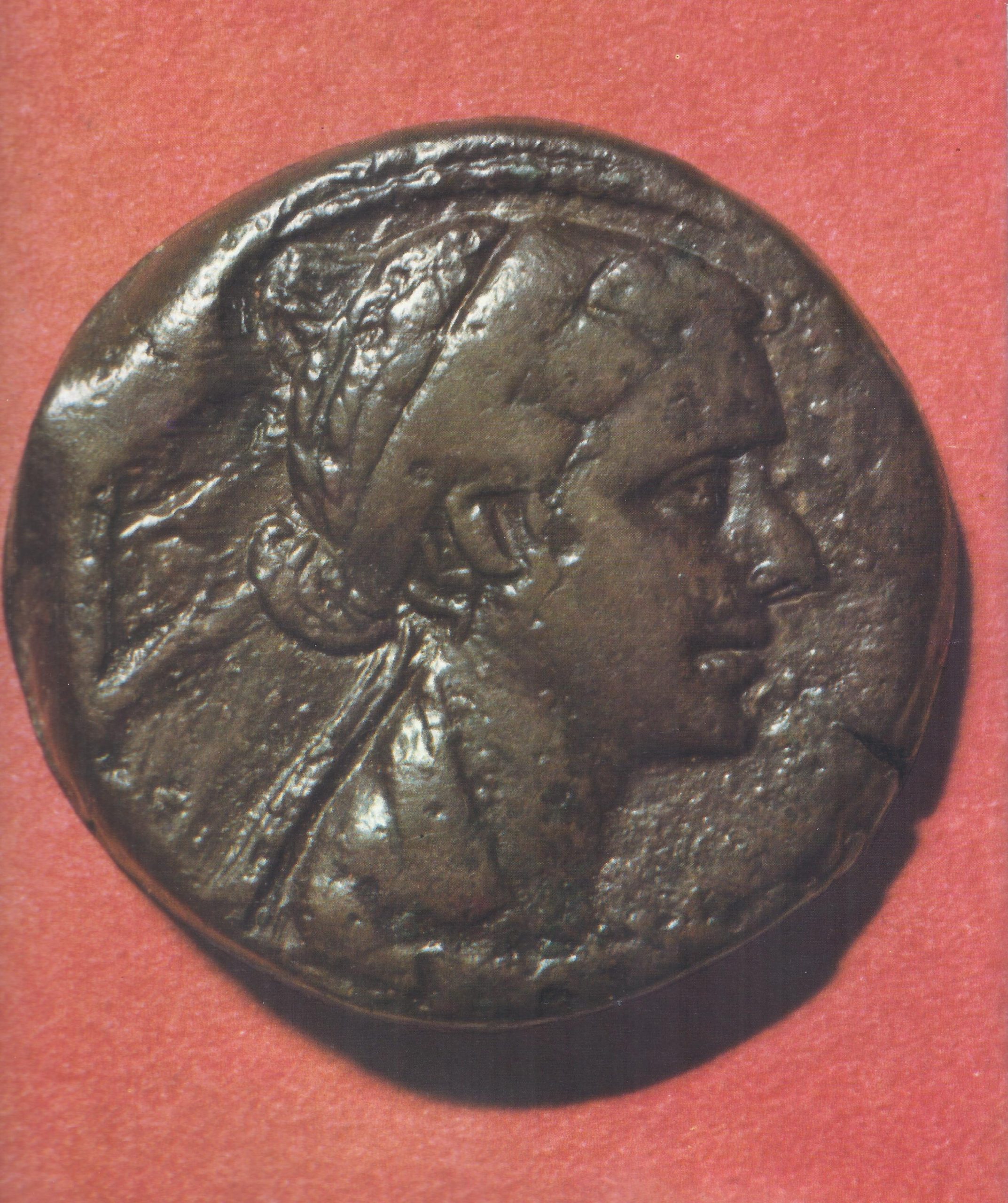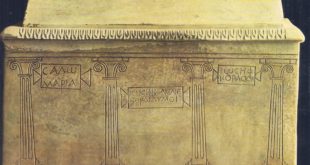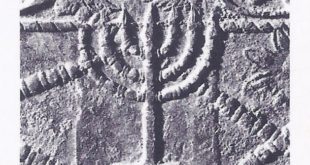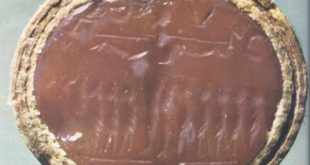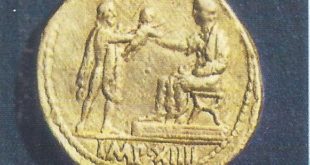The assassination of Julius Caesar in 44 B.C. initiated thirteen years of bloodshed, during which the people who had plotted his death were hunted down and those who remained in positions of power disputed that power among themselves. Finally, the struggle resolved itself into a duel between Octavian, Caesar’s grand-nephew heir and Marc Antony, his most able lieutenant, in alliance with Cleopatra, Queen of Egypt. In the final confrontation at the naval battle of Actium, Marc Antony and Cleopatra were routed and Octavian became ruler of the world as the Emperor Augustus. Egypt’s last bid for world empire had been thwarted. More importantly, the work begun by Julius Caesar was continued and the transition from the anarchy of the end of the Roman Republic to the glory of Empire was completed.
Late in the summer of 31 B.C., the two largest fleets the world had ever seen confronted each other off the northwestern shores of Greece. The four or five hundred warships of Marc Antony, including sixty belonging to Queen Cleopatra of Egypt, faced outward into the Ionian Sea. Against this navy stood another of approximately equal size, which had come with the young Octavian, the future Emperor Augustus, from Italy. War had been declared against the foreigner Cleopatra and by implication, against Antony, her husband in Egyptian, though not in Roman law. The crews on each side numbered well over a hundred thousand men.
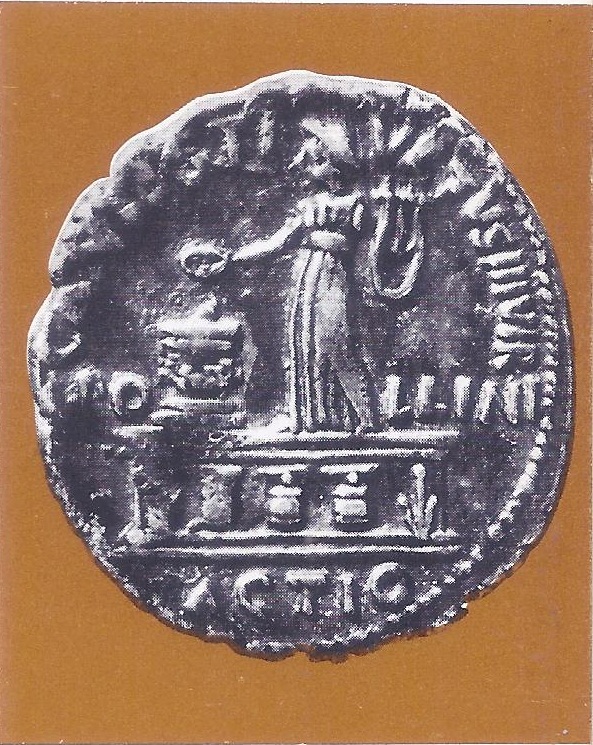
Behind Antony’s ships, on the opposite banks of the narrow channel leading into the Gulf of Ambracia, were posted the two rival armies, each more than eighty thousand strong. Octavian’s troops had come from Italy and landed at a port in Epirus, from which they had marched down and seized the northern promontory at the entrance to the Gulf. Only six hundred yards away, across the channel, they could see the troops of Antony stationed on the southern promontory, the peninsula of Actium.
For some years past, the cold, deliberate Octavian had ruled all the Roman possessions west of the Ionian and Adriatic seas — Italy, Gaul, Spain and much of North Africa. Meanwhile, the more flamboyant Antony — in infatuated alliance with Cleopatra, whose Egypt was nominally independent of Rome — governed the lands that lay eastwards, as far as the Roman frontier on the Euphrates and including the rich territories of Asia Minor. The conflicting ambitions and personalities of the two men however, had made a clash inevitable.
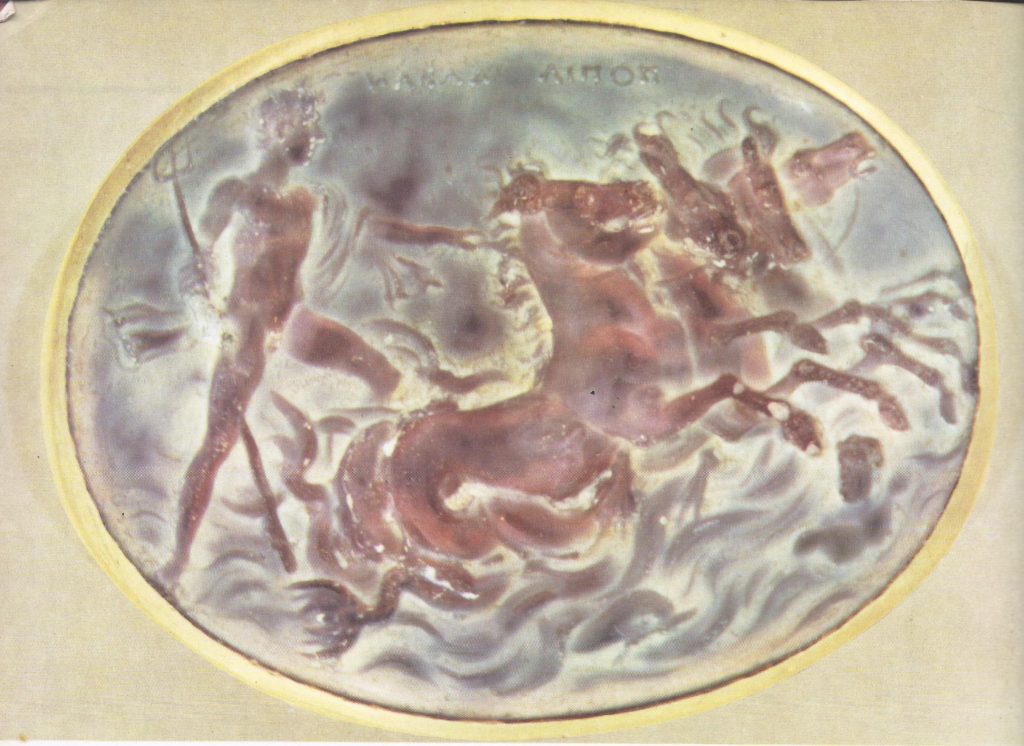
To meet Octavian’s expected thrusts, Antony had moved his land forces up to positions along the western coasts of Greece, deploying his fleet before them, with his strongest contingents concentrated at Actium. Cleopatra, who saw in the confrontation her great hope of winning the entire Roman world, made the enormous treasures of Egypt available to Antony, thereby providing the bulk of his funds. She persuaded him to fight at sea, not, as some of his generals advised, on land. Moreover, she insisted on taking part in the engagement herself, though the presence of this exotic siren — the target of much hostile propaganda from Octavian — undermined the morale of many of Antony’s senior officers. Taking advantage of this situation, Octavian’s admiral Agrippa, a superb tactician, had succeeded in weakening Antony’s position well before the major battle, by persuading several of his important officers to desert the key points for which they were responsible along the Greek seaboard. Antony’s supply lines to Egypt and the east were thus, not only threatened but partially cut. Time was against him and he decided to offer the challenge.
The engagement that followed was one of the decisive encounters in history. Many details have been lost or obscured in a subsequent flood of fragmentary, contradictory accounts, but patient detective work has made it possible to gain some idea of what happened.

Octavian’s purpose at Actium is reasonably clear: destruction of the enemy, the conquest of the eastern provinces and seizure of Egypt’s revenues. Antony’s aims are more obscure. No doubt he, too, hoped to destroy his foes, but, being too good a strategist not to realize that his position had deteriorated, he decided upon an alternative plan. If defeated, he would break through Octavian’s line and sail south and then east into the Aegean. In such an event, his failure to crush Octavian would at least leave him in a position from which he could control his eastern possessions and protect Egypt, the land of his love and of his financial backing.
In preparation for such a contingency, Antony gave two unusual orders: the war chest was to be moved from land and lodged on Cleopatra’s transport ships and the entire fleet was to take its sails on board. The secret transfer of the treasury may not have attracted undue attention, but the shipping of the sails had a most disquieting effect on the men. It seemed to them that Antony was already contemplating flight and although they were no doubt told that the sails were intended solely for victorious pursuit, they could scarcely have been convinced.
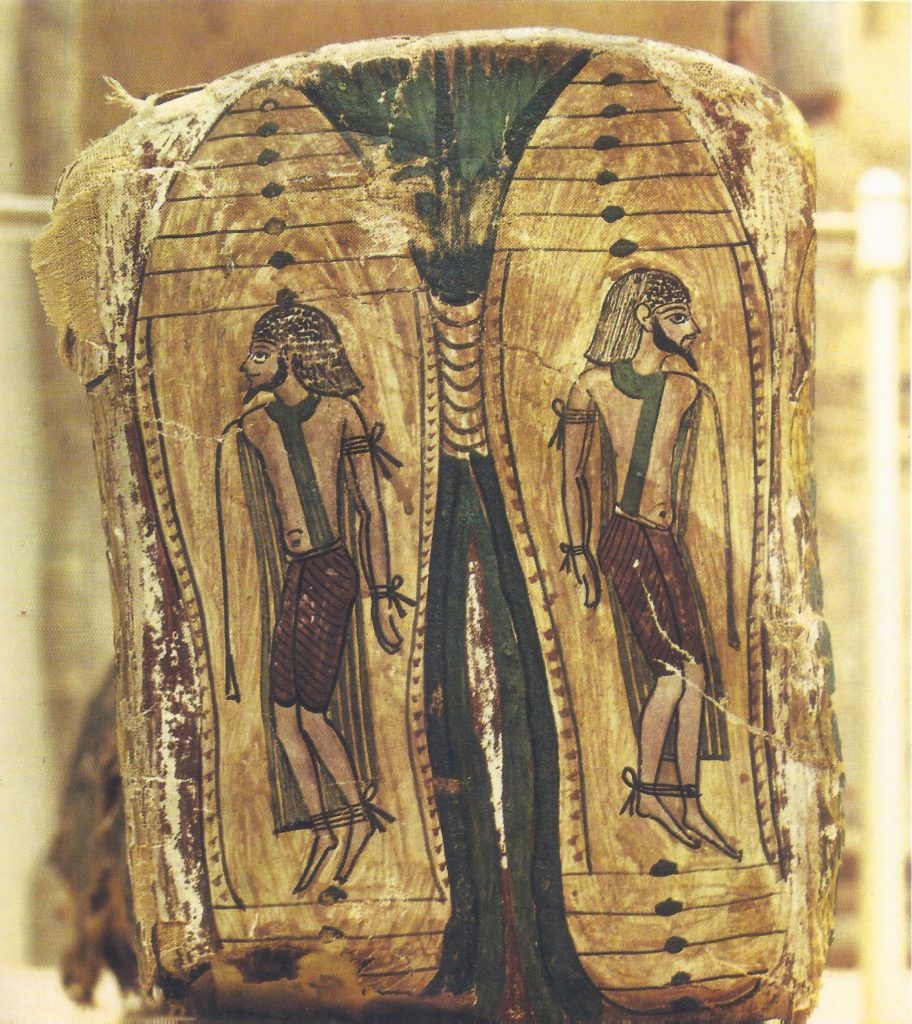
After several days of rough weather, September 2nd brought calm and Antony’s fleet moved out of harbour. While Cleopatra’s well-equipped squadron was kept in the rear — to act as a reserve and to prevent desertions — Antony, at the far right of the front line, directly faced the opposing admiral, Agrippa. Each commander hoped to be able to outflank and turn the other in the afternoon, when a northwest wind usually begins to blow in the Ionian Sea.
The wind shifted and battle was joined. As it raged furiously, Antony witnessed a blood-chilling development: suddenly, three of his six squadrons broke-off action and started back to harbour. There is little doubt that this was treachery, the loyalty of the men had been undermined in advance by the enemy to whom they were now deserting. To Antony himself and to Cleopatra in the second line, the withdrawal posed an immediate and disastrous threat. Now Cleopatra’s flagship, with its gold-encrusted stern and purple sails, was seen to get up speed and set out for the open sea, followed by the rest of her squadron. Those who hated the queen interpreted this move, then and later, as cowardice and betrayal.

It is more likely, though, that Cleopatra acted in accordance with a plan prearranged with Antony in the eventuality of defeat. In any case he, too, made the fateful decision that flight was now the only course. His flagship was so heavily engaged that its extrication was impossible, but he managed to transfer to another vessel and followed by forty or more ships of his squadron, joined Cleopatra in the open sea. As they fled southward toward Egypt, the rest of Antony’s ships fought on. Leaderless and without hope, they were all eventually destroyed or captured. Within a week, the army, which had watched these disasters from the shore, capitulated.
Meanwhile, hastening from the scene on Cleopatra’s flagship, Antony sat in silence and gazed out to sea. His dream of world rule was over and so was hers.
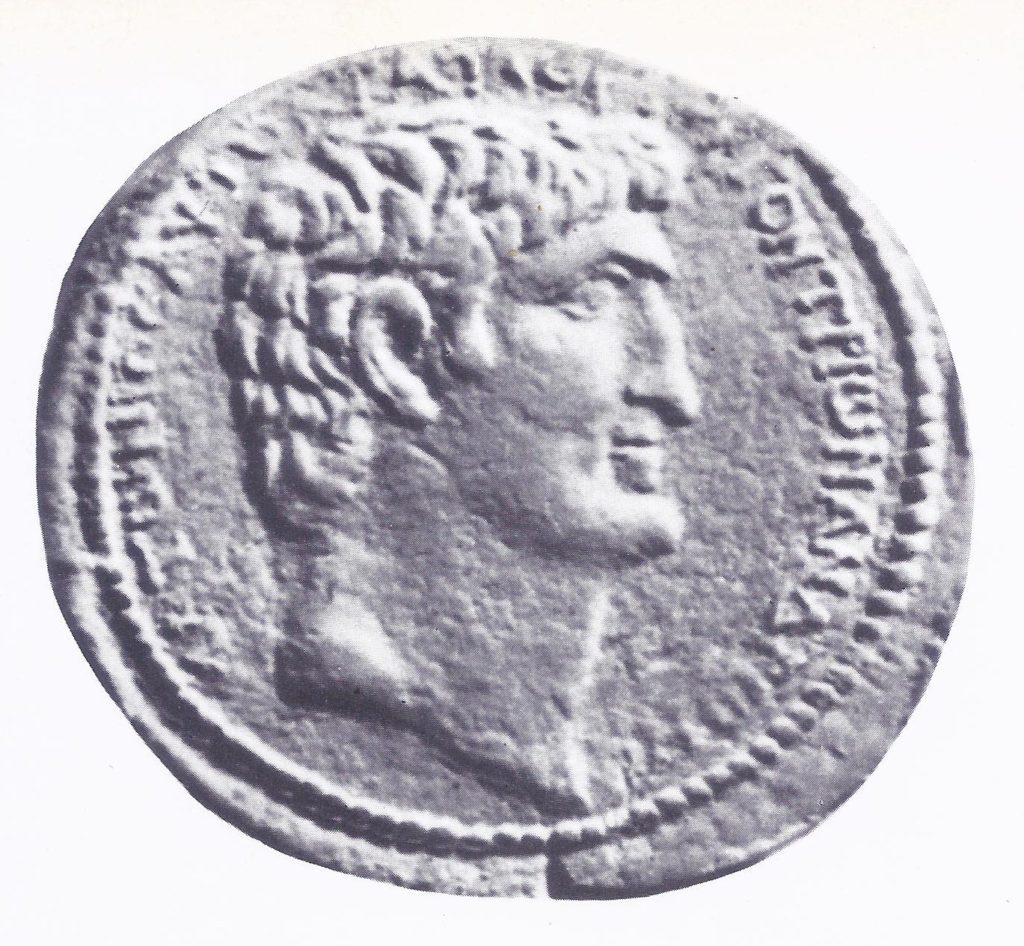
Egypt’s Last Bid for World Empire
According to Virgil, who was a passionate supporter of the victorious side, the battle had been foretold in mythological times, when the god Vulcan had engraved the principal scenes upon the shield given to Aeneas, the founder of Rome’s fortunes:
On one side Augustus Caesar, high up on the poop, is leading
The Italians into battle, the Senate and the People with him,
His home-gods and the great gods: two flames shoot up from his helmet
In jubilant light, and his father’s star dawns over its crest,
Elsewhere in the scene is Agrippa — the gods and the winds fight for him —
Prominent, leading his column: the naval crown with its miniature
Ship’s beaks, a proud decoration of war, shines on his head.
On the other side, with barbaric wealth and motley equipment,
Is Antony, fresh from his triumphs in the East, by the shores of the Indian
Occan: Egypt, the powers of the Orient and uttermost Bactra
Sail with him, also — a shameful thing — his Egyptian wife…
Viewing this, Apollo of Actium draws his bow
From aloft: it creates a panic; all the Egyptians, all
The Indians, Arabians and Sabaeans now turn tail.
Although there were, in fact, no Indians in Antony’s forces, Virgil and many others saw the battle in terms of the millennial struggle between East and West, with Actium commemorating the resistance of Greece to Persia, four and a half centuries before.

The defeated pair did not stop until they came to Egypt. Octavian followed, reaching the outskirts of Alexandria the next summer. In a last desperate attempt to save the city of his queen, Antony resisted Octavian’s advance. In the face of superior numbers, however, the last of Antony’s dwindling troops deserted to the enemy. Returning to the city and hearing a false report of Cleopatra’s death, Antony committed suicide. Unopposed, Octavian entered Alexandria, where Cleopatra attempted to win him over — as she had so successfully won his great-uncle Caesar, and Antony. Octavian was not to be wooed and he actually planned to display his exotic captive in triumph to the Roman crowds. To thwart him and to avoid humiliation, Cleopatra had a snake brought to her and arrayed in royal robes, put it to her breast. She died of its bite, but in her death there was some victory, for the venom of an asp, according to Egyptian religion, imparted immortality.
Caesar’s Heir Emperor Augustus the Victor
Augustan poets generally had no love for Cleopatra, but Horace at least could not withhold his admiration:
In calm deliberate death too proud
To freight Liburnian galleys and be shown
In Triumph, fallen from her throne:
The mockery of a Roman crowd.
Thus it is, that Egypt fell into the hands of the ruler of Rome. The kingdom founded by Alexander’s general Ptolemy had come to its final end and the last of the great successor kingdoms of Alexander was no more. First Macedonia had gone, then Pergamum (which had become independent of the Seleucid empire of Syria and the east), then the Seleucids themselves, and now, finally, Egypt. For many years past, it is true, Egypt had not been fully independent of Rome. Cleopatra’s father, Ptolemy Auletes, was obliged to call for Roman aid to regain the throne from which the Alexandrians had chased him. The Roman aid came at a high cost and one of those who had to be paid enormous sums, was Julius Caesar. It was principally in order to collect that money that he went to Egypt and fought the Alexandrian War in 48 – 47 B.C. He also had the enjoyable experience of meeting Cleopatra, whom he established as ruler of the country. Whether he would have allowed her an empire, however, is doubtful. At any rate, he died while she was in Rome and Cleopatra returned to Egypt declaring that her child Caesarion was Caesar’s, though this claim was and is still disputed.

Later, supported by the love and troops of Antony, she indeed became an empress. Unprecedentedly placing the head of this foreign woman on his coins, Antony described Cleopatra as ‘‘Queen of kings and of her sons who are kings.” The defeat at Actium brought the whole dream to an end. Despite some interruptions, Egypt had been a united and independent country for the better part of three thousand years. Now it belonged to Rome.
It was a strange empire that Octavian now ruled. Kings were traditionally unpopular in Rome and the fate of Caesar had shown that dictators were not wanted either. Yet Octavian guessed that the Romans, eager for peaceful order, would be willing to accept autocracy if Republican institutions were revived. In 27 B.C. he solemnly renounced all extraordinary powers and officially transferred the State to the free disposal of the Senate and the people of Rome. Nevertheless, he reserved various means of maintaining control. In the huge group that constituted his special provinces — the greater part of Gaul, Spain and Syria, as well as the whole of Egypt — he ruled, through subordinates, as supreme governor. He also held, for life, the ancient, democratic-sounding power of the Tribunes, the traditional supporters of the common people’s rights. He chose to be designated ‘‘princeps,” took the venerable name Emperor Augustus and induced first the western and then the eastern territories, to swear an oath of personal allegiance; an oath which meant more to ordinary citizens than the constitutional fictions that soothed the governing class.

The key to empire was the army. After the battle of Actium, the number of legions (including Antony’s, which Emperor Augustus inherited) amounted to sixty. The maintenance of so many troops was not only extravagant but perilous to authority, so Emperor Augustus reduced the legions to twenty-eight — approximately 150,000 men. Nearly all these professionals were Italians or westerners; a further 150,000 auxiliaries were from less civilized parts of the Empire and usually served in their country of origin.
The army was not the only branch of administration that Emperor Augustus transformed to cope with imperial complexities. The Senate was reduced from nine hundred to six hundred members, and the consuls — annually elected chief magistrates — took on important new juridical duties. These duties, performed in collaboration with the ruler, gradually eclipsed the existing law courts. Thus, the old governmental and legal systems that Tacitus described as “incapacitated by violence, favoritism and (most of all) bribery” were at last reformed. Augustus was helped, of course, in maintaining this great new multiracial system by the senators who governed major provinces in accordance with his wishes.

Egypt, however, was in the peculiar position of having as governor not a senator, but a knight. The Order of the Knights had risen to wealth as Rome became an imperial power and yet, being outside the Senate, had hitherto held no governmental power. Under Emperor Augustus the Order was reorganized to provide the beginnings of an Imperial Civil Service. Knights were posted as agents or procurators with such financial duties as tax collection. They could become commanders of the Vigiles, a metropolitan police force and fire brigade of seven thousand ex-slaves; they could serve as generals commanding the Praetorian Guard and they were entrusted with Rome’s vital corn supply.
It was perhaps for this last reason that Emperor Augustus put knights in control of the immense wealth he had won at Actium. For Egypt, despite a steady political decline, was an enormously rich country and its main asset was corn. The Ptolemies had organized a centralized economy which ensured that most of the country’s resources remained in their own hands. So determined was Augustus that no one should share the profits he had won that he went to the exceptional length of forbidding any Roman senator to visit Egypt without his permission.

Rome’s Golden Age Begins
It was not the first time that Rome’s financial situation had been transformed by the acquisition of immensely rich territories. Pergamum in western Asia Minor had become a province in 133 B.C. and Syria was won seventy years later by Pompey from the last feeble descendants of Alexander’s general Seleucus. Now there was Egypt. Rome itself had become very largely a subsidised city fed from its overseas provinces and Roman rulers could never for long forget about corn, since their popularity and success depended upon it. Moreover, successive Roman politicians of the previous century had gradually adopted the Hellenistic concept that a great deal of corn must be distributed to the people below the market price — or even free.
Thus Egypt at once became an indispensable bulwark of the Empire. In the centuries that followed, the economic dependence of Rome on supplies from its largest dominions eventually led to the establishment of rival centres of power outside the capital and there were those who deplored the parasitic condition of the city. Yet, if there were disadvantages to the system, the whole of industry, commerce and communications prospered under Emperor Augustus and the Pax Romana brought new security and freedom of intercourse throughout the Empire. Now for the first time the last bit of Mediterranean shore was under Roman control; to them it had indeed become Mare Nostrum, Our Sea.

